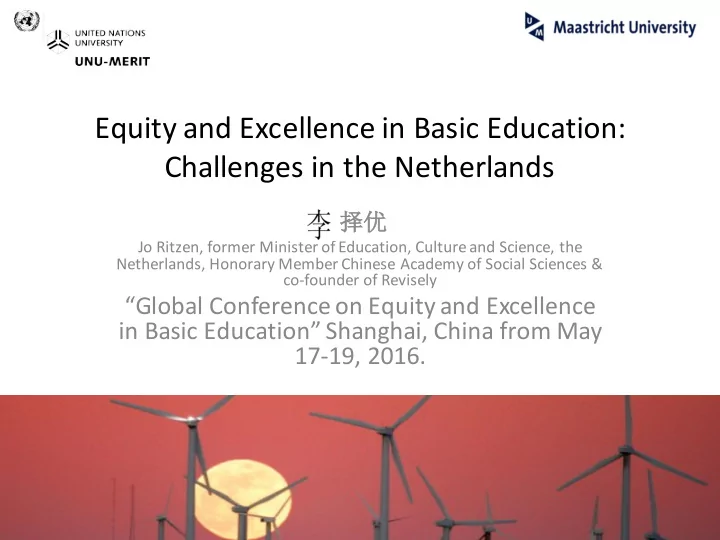

Equity and Excellence in Basic Education: Challenges in the Netherlands 择优 Jo Ritzen, former Minister of Education, Culture and Science, the Netherlands, Honorary Member Chinese Academy of Social Sciences & co-founder of Revisely “Global Conference on Equity and Excellence in Basic Education” Shanghai, China from May 17-19, 2016.
The Netherlands as a country in top 10 world-wide • GDP per capita: no. 14 of the world. • Happiness/ life satisfaction: no. 7 (2016). • Innovation index: no. 4 (2015). • PISA: in top 10. • % GDP on basic education (mostly public): 3.5% (OECD and EU average).
Challenge: change towards learning outcomes for 21st century Content: • PISA, what it signifies for a country in search of strengthening social cohesion and sustainable economic growth. • Future demands for learning outcomes. • How schools affect learning outcomes: Dutch autonomy. • Equity challenges in the Netherlands. • Teachers for future learning outcomes. • The political process of change.
What signifies PISA Cognitive outcomes (social and behavioral outcomes are not included). Contribution to growth from cognitive outcomes: Ø Not only PISA country averages, but also shape of PISA distribution counts, in particular average of lowest 30% and average of top 10%. Ø Trade-offs in shape of distribution? NOT OBSERVED.
Two illustrative shapes of distributions of competencies PISA 2003 (15 year olds)and PIAAC 2011 (8 years later: 23 year olds). Italy Netherlands PISA_2003_AGE15 PIAAC_2011_AGE23 PISA_2003_AGE15 PIAAC_2011_AGE23 50 50 40 40 Percent 30 30 Percent 20 20 10 10 0 0 Below Level 1 Level 2 Level 3 Level 4 Level 5 Level 6 Below Level 1 Level 2 Level 3 Level 4 Level 5 Level 6 Level 1 Level 1
PISA PIAAC LABOR PRODUCTIVITY General conclusion from 17 countries participating in PIAAC: high in PISA is also high in PIAAC (with Australia as the exception) is high in labor productivity.
PISA and future demands for education outcomes
How schools affect PISA outcomes • Structure : empowerment of teachers; innovation capacity • More autonomy leads to better outcomes (Dutch system perhaps internationally most autonomous). • Funding and teacher salaries. • Teachers’ (recurrent) education. • Special attention for children from other cultures (migrant children).
Dutch school autonomy (and full “parental choice”). Full autonomy for school (=school leadership): - Financially (carry-over; lump sum finance per pupil; borrowing and lending); - Personnel ( recruitment, dismissal, promotion are a school responsibility); - Pedagogical and curriculum (no Government rules) freedom.
Full parental choice • The same funding per student everywhere in the country. • Parent choose according to the (ample) available information on the quality of the school and its pedagogical approach. • Schools compete for students based on results and on pedagogical approach (and may go broke).
Accountability • Pupils have to satisfy “end – terms” (minimum achievements) at the age of 12 before entering secondary school; • Secondary schools have national exams;
Challenged equity • Equality of opportunity appears to be declining since the birth cohorts born after 1980 perhaps as a result of more segregation in housing by socio-economic groups, in particular between immigrants and non-immigrants. • Equality of opportunity is not only a social, but also an economic issue.
Challenges for teaching profession • The inflow of teacher training institutes in generally exhibits too low levels of numeracy Raise entrance requirements. • Recurrent education essential to retain the teaching qualification has been lagging Introduce “register” for well-trained teachers. • The relation between the class room and the academy is too limited Upgrade teacher training academies to academic institutions. • Teacher mobility is too high in schools with many at risk children, undercutting the quality of education Pay teachers extra in at risk schools.
Politics of change • National debate on strengths and weaknesses of national education. • International experience as evidence (OECD, World Bank): “education learns”. • Challenging (and threatening) existing interests. • Led by national icons from society. • Base document from Government to be discussed with population at large.
Thank you
Recommend
More recommend